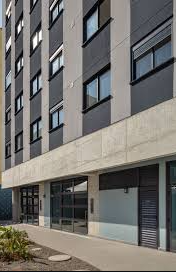
The housing giants commit to extensive cladding repairs following Grenfell tragedy, with costs soaring
Barratt Developments and Redrow are both confronting steep financial commitments as they pledge to undertake further fire safety upgrades in response to the Grenfell Tower tragedy. Barratt, a leading FTSE 100 company, has reported that its cladding improvement costs will likely range between £350 million and £400 million.
Hours prior, Redrow allocated an additional £164 million for similar safety projects, pushing its total fire safety expenditure to £200 million. Both companies are now signatories to the Government’s updated Building Safety Pledge, which introduces stricter requirements for addressing unsafe cladding risks on buildings measuring between 36ft (11m) and 59ft (18m) in height.
MJ Gleeson, another competitor in the housing market, confirmed its commitment to the pledge on Wednesday while also noting assessments on 15 buildings it previously developed that are over 36ft tall. Gleeson is aiming to conclude its assessments by June’s end but has yet to identify any associated costs.
This development follows similar announcements from Crest Nicholson and Taylor Wimpey on Tuesday, indicating that the financial burden continues to escalate. While Barratt has expressed intentions to recover costs from other parties involved in the construction process, it remains uncertain whether these efforts will yield success.
David Thomas, CEO of Barratt, highlighted the company’s position: “We have always been clear that we do not believe leaseholders should pay for remediation of their homes and are committed to helping affected leaseholders living in the buildings we developed. Through constructive engagement between industry and Government, a proportionate and sensible approach has been found and we look forward to completing the remediation process as quickly as possible.”
Meanwhile, Redrow has emphasised its role in building high-rise apartments between 2000 and 2010 and outsourcing much of the design and construction to contractors. They have stated that the financial responsibility should not rest on leaseholders but will involve working with leaseholders to remediate buildings while seeking compensation from contractors and other third parties, although this remains uncertain.
Redrow added: “These remediation works are expected to take a number of years to complete.”
James Thompson, CEO of MJ Gleeson, echoed the sentiment that leaseholders should not carry financial responsibility for addressing fire safety risks. He expressed his full support for the Government’s efforts to involve the wider industry in addressing these issues, stating: “The housebuilding sector has responded positively to this initiative and is playing a proactive role and at significant cost.”
Thompson also reiterated that his company will maintain collaborative efforts with the Department for Levelling Up, Housing and Communities (DLUHC) and other stakeholders to resolve this critical issue efficiently.











